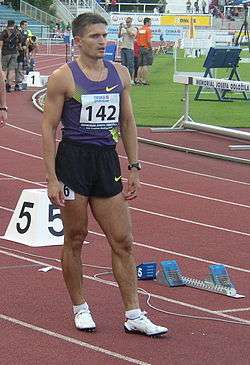Aleksandr Derevyagin
Alexsandr Derevyagin (Russian: Александр Деревягин; born March 24, 1979) is a Russian hurdler.

Aleksandr Derevyagin at the 2010 Josef Odložil Memorial in Prague
He finished 8th in the 400m hurdles final at the 2006 European Athletics Championships in Gothenburg.
He also competed in the 4 × 400 m relay team for Russia at the 2006 IAAF World Indoor Championships, winning a bronze medal.
Competition record
| Year | Competition | Venue | Position | Event | Notes |
|---|---|---|---|---|---|
| Representing | |||||
| 2003 | Universiade | Daegu, South Korea | 6th | 400 m hurdles | 50.01 |
| 2005 | Universiade | Izmir, Turkey | 4th | 400 m hurdles | 49.78 |
| 2006 | World Indoor Championships | Moscow, Russia | 3rd | 4 × 400 m relay | 3:06.91 |
| European Championships | Gothenburg, Sweden | 8th | 400 m hurdles | 50.31 | |
| 2007 | World Championships | Osaka, Japan | 11th (sf) | 400 m hurdles | 49.11 |
| 2008 | Olympic Games | Beijing, China | 11th (sf) | 400 m hurdles | 49.23 |
| 2009 | World Championships | Berlin, Germany | 21st (h) | 400 m hurdles | 49.83 |
| 8th (h) | 4 × 400 m relay | 3:02.78 | |||
| 2010 | European Championships | Barcelona, Spain | 7th | 400 m hurdles | 49.70 |
| 2011 | World Championships | Daegu, South Korea | 8th | 400 m hurdles | 49.32 |
| 2012 | European Championships | Helsinki, Finland | 11th (sf) | 400 m hurdles | 50.02 |
gollark: Can't you just have more low-power modes?
gollark: It seems kind of horrifying that SIM cards do so much. This sort of thing is bound to have vulnerabilities.
gollark: I currently use caddy with php-fpm (connected over FastCGI) for that one stupid PHP application I have to run.
gollark: People *use* that?
gollark: I can anecdotally confirm that my Intel Dual Band Wireless-AC 7265 or whatever the stupidly long brand name is works very well under Linux. Except for some random dropouts which were fixed when I switched NetworkManager to using `iwd` instead of `wpa_supplicant`.
This article is issued from Wikipedia. The text is licensed under Creative Commons - Attribution - Sharealike. Additional terms may apply for the media files.